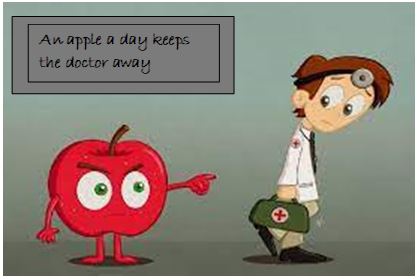Well, nobody is keen on seeing a doctor. So, every morning, I wish myself and all my near-dear ones and colleagues the best of their health because I do not want them to see a doctor. Indeed, we all grew up with this common 19th-century proverb, “An apple……………away”. Being a kid, I always pondered, is it true? Now, here I am to profess the same because an apple can reduce low-grade inflammation in people.
In the current times of McDonald’s, Pizza Hut, Burger King and joints like that, the younger population is much more inclined to such kinds of high-fat foods. Besides, processed and high sugary foods and beverages are also in vogue. The increased consumption of high-fat, ready to eat foods/drinks is culture, mindset, taste, and peer-group motivation. Lack of exercise, a sedentary lifestyle, mainly due to mobile phone addictions, and laziness in cooking fresh food are also the reasons. As a result, most of the city-dwelling populations in the world are becoming obese. What happens to the physiology of such obese people? Yes, low-grade chronic inflammation leads to various metabolic disorders such as type II diabetes, cardiovascular diseases (CVD), cancer and so on. Hence, the solution to curb such metabolic disorders is to reduce low-grade chronic inflammation. The critical protein responsible for low-grade inflammation is the C-reactive protein (Trumann et al., 2022).
An Apple can reduce C-reactive protein in people
Apples are rich in anti-inflammatory bioactives with polyphenols and fibre. In overweight and obese conditions, the circulating inflammatory biomarker C-reactive protein (CRP) is increased. Epidemiological data revealed that plant-based foods reduce CVD risk. Regular consumption of whole apples in individuals reportedly reduced the levels of CRP ≥ 3.0mg/mL. Polyphenols have anti-inflammatory effects, antioxidative actions and modulation of cell signalling cascades related to inflammatory cytokine produced. Apples are the largest sources of phenolic compounds in the Western diet and also in Northern Himalayan India, especially in apple growing belts. Apples have the highest proportion of free phenolics compared to other fruits. Red apples, particularly Gala and Royal varieties, are the primary source of polyphenols, harbouring ~ 2-6 times more polyphenols as compared to other apple varieties. A randomized, controlled, parallel-arm trial was conducted with 46 participants. Human intervention studies have suggested potential health benefits of apples, mainly anti-inflammatory effects. The study has shown that consuming three small Gala apples daily for six weeks alleviated circulating biomarkers of inflammation and endotoxin exposure, including CRP, IL-6 and LBP.
Till now, as per the best of our knowledge, only two human studies have investigated the effects of whole apples on inflammatory biomarkers, neither of which focused on obese or overweight participants. In the study by Liddle et al. (2021), TNF-𝛼, however, remained unaffected till six weeks of daily Gala apple consumption. The anti-inflammatory effects of daily consumption of Gala apple are supported by findings in isolated PBMCs, which are mainly composed of lymphocytes and monocyte cells involved in chronic low-grade inflammation in overweight and obese individuals. Forty-four participants completed the trial (30 female, 14 male; mean ± SEM age: 45.4 ± 2.2y; BMI: 33.4 ± 0.9kg/m2). This was the first study to show that 6wk consumption of whole Gala apple might effectively appease inflammation in overweight and obese individuals. However, apples did not alter the anthropometric risk markers. Moreover, regular consumption of apples alleviates the occurrence of comorbidities associated with excess adiposities, such as CVD.
The consumption of apples, especially the Gala/Royal Gala, can also be recommended for people suffering/ recovering/recovering from COVID-19 infections, a present-day problem. As COVID-19 conditions are associated with elevated CRP levels leading the secondary infections/complications (Kooistra et al., 2021), either immediately or over some time, the reduction of CRP levels might help such individuals to return to normal physiology. Finally, a message to all: “Choose the Gala/Royal apple variety, eat one apple daily and keep CRP away”.
References:
- Liddle, Danyelle M et al. “Daily apple consumption reduces plasma and peripheral blood mononuclear cell-secreted inflammatory biomarkers in adults with overweight and obesity: a 6-week randomized, controlled, parallel-arm trial.” The American journal of clinical nutrition vol. 114,2 (2021): 752-763. doi:10.1093/ajcn/nqab094.
- Truman, S. C., Wirth, M. D., Arp Adams, S., Turner-McGrievy, G. M., Reiss, K. E., & Hébert, J. R. (2022). Meal timing, distribution of macronutrients, and inflammation among African-American women: A cross-sectional study. Chronobiology international, 39(7), 976–983. https://doi.org/10.1080/07420528.2022.2053702.
- Kooistra, E. J., van Berkel, M., van Kempen, N. F., van Latum, C., Bruse, N., Frenzel, T., van den Berg, M., Schouten, J. A., Kox, M., & Pickkers, P. (2021). Dexamethasone and tocilizumab treatment considerably reduces the value of C-reactive protein and procalcitonin to detect secondary bacterial infections in COVID-19 patients. Critical care (London, England), 25(1), 281. https://doi.org/10.1186/s13054-021-03717-z
This blog has been written by Mr Sumit Mallick. Sumit is a PhD student/Junior Research Fellow, in the Stem Cells and Regenerative Medicine Centre, Yenepoya Research Centre, Yenepoya (Deemed to be University), Mangalore, Pincode-575018 Karnataka, India. He can be reached at the electronic address: 19466@yenepoya.edu.in

Edited by: Dr Bipasha Bose, Associate Professor (Senior/Grade II), Stem Cells and Regenerative Medicine Centre, Yenepoya Research Centre, Yenepoya (Deemed to be University), Mangalore-575 018, Karnatka, India. Dr Bose can be reached at the electronic address: bipasha.bose@yenepoya.edu.in


Comments are closed.